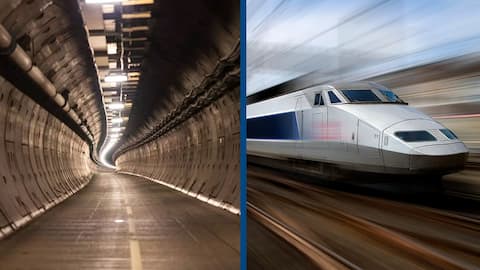London-New York in 60 minutes: The $20 trillion transatlantic shortcut
What's the story
Rumors have circulated this week about a potential $20 trillion (₹165 lakh crore approximately) plan for a transatlantic tunnel. The ambitious project seeks to connect London and New York in just an hour using vacuum tube technology. But, as Newsweek estimates, the construction of this 3,000-mile tunnel could take nearly a millennium at the pace of Europe's Channel Tunnel.
Practicality
Transatlantic Tunnel: Dream or reality
The concept of a "Transatlantic Tunnel" has been around for some time, but challenges related to scale, cost, and practicality have hindered its progress. While flights between London and New York City take approximately eight hours, the feasibility of high-speed trains traveling beneath the ocean making the journey fast enough to justify the immense construction costs has remained uncertain. Spanning over 3,000 miles between the two cities, building such a tunnel would be a massive undertaking.
Hyperloop
Vacuum tubes and the future of high-speed transit
Advances in vacuum tube technology have brought the concept closer to reality. By maintaining a vacuum inside the tunnel and using pressurized vehicles, trains could potentially reach speeds exceeding 3,000 mph, reducing the travel time between London and New York to just under an hour. In a vacuum tunnel, trains encounter no air resistance, enabling them to achieve much higher speeds than traditional trains. This concept, often referred to as a "hyperloop," has recently seen advancements in Indian transportation.
Infrastructure developments
Undersea tunnel projects underway in Europe
In Norway, the Rogfast project has started, with plans to build the world's longest and deepest undersea road tunnel. Meanwhile, northern Europe is preparing for the Fehmarnbelt Tunnel between Denmark and Germany, which is due to open in 2029. Southern Europe, on the other hand, is considering new infrastructure projects such as a possible bridge connecting Greece and Turkey.
Infrastructure controversies
UK's HS2 railway project and abandoned bridge plan
With the UK currently working on the HS2 railway project, which costs an estimated $416 million (₹3,435 crore approximately) per mile, one may wonder if this is really necessary. In the past, the country had even considered a bridge to connect Britain and Ireland over a 12-mile stretch of deep waters. However, the plan was scrapped due to issues like radioactive waste and unexploded munitions.
